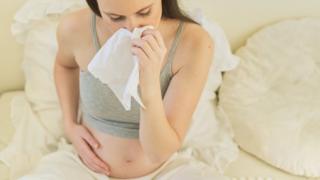 Image copyright Getty Images
Image copyright Getty Images As a precaution, pregnant women have been told to be particularly strict about avoiding social contact, so they reduce their risk of catching coronavirus. But what do we know about its impact on pregnancy?
Is coronavirus a problem during my pregnancy?
Although there is still much that doctors don’t know about how pregnancy can be affected by the virus, pregnant women do not appear to become more unwell than other healthy adults who contract it.
“If there were huge risks, we would have seen them by now,” says Christoph Lees, professor of obstetrics at Imperial College London.
Like the general population, if they are infected, the vast majority of pregnant women will have mild or moderate symptoms and recover. These include cough, fever, shortness of breath, headache and loss of sense of smell.
Coronavirus can be a problem in pregnancy if women become seriously ill with Covid-19, but that is very rare.
Women from black, Asian or ethnic minority backgrounds (BAME) may be at higher risk of complications from Covid-19 and are encouraged to seek advice quickly if they are worried about their health during pregnancy.
Pregnant women with serious heart problems are in a very high-risk group and it is recommended that they stay at home at all times and avoid any face-to-face contact. They should contact doctors about their care.
Some viruses are worse in pregnant women, but there is no evidence this is the case for this coronavirus.
What did recent UK research find?
Early research based on 427 pregnant women admitted to hospitals in the UK with Covid-19 found most were more than six months pregnant, stressing the importance of social distancing in the third trimester.
Pregnant women from ethnic minority backgrounds, older mothers over 35, and those who were overweight or obese were more likely to need hospital treatment for the lung disease, data from the UK Obstetric Surveillance System found.
The majority of the women gave birth safely, although one in 10 required intensive care. Fewer than 20 babies were born before 32 weeks.
Scientists are studying the experiences of pregnant women through the Pan-Covid Pregnancy and Neonatal Registry.
Is there a risk of my baby being born prematurely?
Some reports are emerging of babies being born early to women who were very ill with the coronavirus, but it’s hard to know the reason for delivery.
“Where a reason is given, it may be due to signs of distress in the baby or to allow better treatment for low oxygen levels in the woman,” says Dr Ed Mullins from Queen Charlotte’s and Chelsea Hospital, London.
During pregnancy, a growing baby places some pressure on the lungs, heart and circulation of its mother. Being seriously ill with Covid-19 could make this situation worse and cause breathing difficulties.

Media playback is unsupported on your device
Any woman in this position would be watched extremely closely in hospital.
“Acute illnesses which cause fever can be associated with premature labour and birth,” says Prof Marian Knight, professor of maternal and child population health from the University of Oxford.
However, she said most premature births were early Caesareans in women with Covid-related breathing problems, rather than because of premature labour starting.
There is no evidence of an increased risk of miscarriage if a woman becomes infected.
Can I pass the virus to my baby during pregnancy?
This is possible. There have been reports of a small number of cases, but the newborns were discharged from hospital and are well.
A study from China found three out of 33 babies born to mothers with Covid-19 were infected.
It is difficult to work out if the babies were infected in the uterus, during labour or soon after birth, when a newborn is likely to have had close contact with the mother.
There is no evidence of the virus causing problems with a baby’s development, says the Royal College of Obstetricians and Gynaecologists (RCOG).
What should I do if I’m pregnant and think I have the virus?
If you have any coronavirus symptoms, you should use the NHS 111 online service (or NHS 24 in Scotland) to get a test and then follow the latest guidance on staying at home.
If you’ve got any routine appointments in that time, you should let your midwife, antenatal clinic or maternity unit know about your symptoms.
Most women will have mild symptoms which should go away in a few days.
But if you start feeling worse, you should contact your GP, the NHS via 111 (or NHS 24 in Scotland), your maternity unit – or 999 in an emergency.
The RCOG has lots more advice on its website for pregnant women and their families.
Are scans and appointments being affected?
They could be, but if you are advised to go to an appointment then you should go if you are feeling well.
“This is because the need for the appointment to help reduce the risk of complications for you and your baby is greater than your risk of being exposed to coronavirus,” says advice from the RCOG.
Essential scans and tests may be offered within a single appointment to prevent lots of different journeys to hospital.
Should I be working if I’m pregnant?
If you are pregnant and can work from home, you should.
If you are more than 28 weeks pregnant or have an underlying health condition, this is particularly important as you should be avoiding unnecessary social contact.
Women less than 28 weeks pregnant can continue to work outside the home provided they take the necessary precautions, including keeping social interactions down, staying 2m from others where possible, and washing hands carefully and regularly.
Your employer should consult you on how you can work safely.
Source: BBC News – Health










